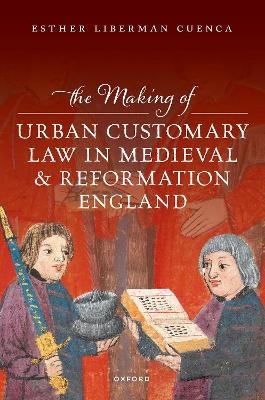
The Making of Urban Customary Law in Medieval and Reformation England
Oxford University Press (Verlag)
978-0-19-891677-2 (ISBN)
- Noch nicht erschienen (ca. März 2025)
- Versandkostenfrei innerhalb Deutschlands
- Auch auf Rechnung
- Verfügbarkeit in der Filiale vor Ort prüfen
- Artikel merken
The Making of Urban Customary Law argues that urban customs, which governed the lives of people in English towns, were crucial to the development of a distinct, bourgeois identity in England-an evolution that this new study tracks from the early twelfth to the late sixteenth centuries. In the years following the Black Death, and especially during the Reformation period, this law became more concerned with defining political authority, maintaining morality, and articulating a consensus about the “common good” for townspeople.
This book makes two principal claims: First, customary law advanced the business interests of an urban oligarchy. These were urban (male) elites who drafted laws and obtained privileges to enhance their wealth and assert their political independence from local lords, and often made claims about the legitimacy of their privileges or laws by rooted them in history or some kind of ancestral past. These lawmakers also made considerable efforts to establish their identities as morally upright and even-handed patriarchs. In so doing, urban customary law played a central role in the development of a distinct bourgeois identity in medieval and Reformation England. Second, this law lent particular meanings to the “common good” in towns, as it helped these lawmakers articulate policies that cohered to their vision of an ideal civic community.
Esther Liberman Cuenca received her PhD in History from Fordham University and is Assistant Professor of History at the University of Houston-Victoria in Victoria, Texas. She is an editor of the undergraduate textbook, Law, Justice, and Society in the Medieval World: An Introduction through Film (Fordham Press, 2025), and her essays have appeared in Urban History, The Paris Review, Continuity and Change, and Historical Reflections/Réflexions Historiques. She has received fellowships and awards from the Mellon Foundation, Medieval Academy of America, and American Philosophical Society. In 2022/23, she was a Member at the Institute for Advanced Study in Princeton.
Introduction
1: The Making of Urban Charters and Custumals
2: The Authorship and Transmission of Urban Custumals
3: Customary Time and Urban Memory
4: Custom, Community, and the Common Good
5: Unenfranchisement: The Gendered and Classed Boundaries of Custom
6: Oath-Taking and the Performance of Urban Customary Law
Coda
| Erscheint lt. Verlag | 27.3.2025 |
|---|---|
| Verlagsort | Oxford |
| Sprache | englisch |
| Maße | 156 x 234 mm |
| Themenwelt | Geschichte ► Allgemeine Geschichte ► Mittelalter |
| Geschichte ► Teilgebiete der Geschichte ► Kulturgeschichte | |
| Recht / Steuern ► Allgemeines / Lexika | |
| Recht / Steuern ► EU / Internationales Recht | |
| ISBN-10 | 0-19-891677-9 / 0198916779 |
| ISBN-13 | 978-0-19-891677-2 / 9780198916772 |
| Zustand | Neuware |
| Haben Sie eine Frage zum Produkt? |
aus dem Bereich


